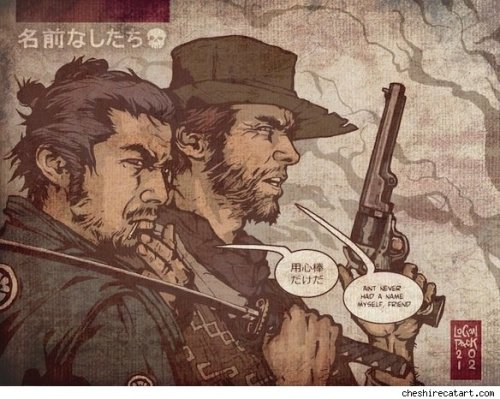The "Man With No Name" Series, a.k.a. the "Dollars" films:
Yojimbo (1961, Kurosawa)
Sanjuro (1962, Kurosawa)
A Fistful of Dollars (1964, Leone)
For a Few Dollars More (1965, Leone)
The Good, the Bad and the Ugly (1966, Leone)
Many people know that A Fistful of Dollars was a remake of Kurosawa's Yojimbo. The plot goes pretty much scene for scene from the original, although Eastwood plays a slightly different hero than does Mifune. For a Few Dollars More may have borrowed some elements from the Japanese sequel, Sanjuro, but it is quite different. For a Few Dollars more takes the character of the Man with No Name in
a certain direction-- he has a sense of humor, but Eastwood is certainly for sale. By
the time that trilogy ends, his morality is determined by the Almighty Dollar.
In Sanjuro, the character becomes more moral, taking on the
cause of the underdog, even offering to sacrifice himself and proves himself wise in the arena of politics with a
military twist. As per usual, the Man with No Name (who names himself
"30-year Camellia" on a lark) arrives in a town split by violent
factions. In this case, one faction is behind truth and justice and the other
is not. As usual, our anti-hero gets involved, and his methods are... unusual.
At the very least, unexpected. The "good" faction are often fighting
about whether to listen to the man.
What is most unique in this film is the insertion of a
female, even gentle, point of view. Recognizing Mifune as a "glinting
sword" an older woman recommends that he would be better off as "a
sword in a sheath." We find our anti hero questioning himself, even making
errors, because of his excessive violence and self-assurance.
I love Mifune's take of this character, at one point lazy,
another yelling, another deeply considering as he rubs his face. So full of life and joy. I am really beginning to appreciate the
appearances of Tatsuya Nakadai, here as Mifune's counterpart on the corrupt
side of the equation. This is the one
place where I can see a similarity between Sanjuro and For a Few Dollars More--
in the uncomfortable camaraderie of equals.
That aspect truly enriches both films, although it is minor in Sanjuro.
One of the fascinating aspects of Sanjuro, which is also played with in Harakiri, is the facade of dishonor, even betrayal, for the sake of loyalty and honor. The nine young samurai are often discussing whether Mifune is simply unorthodox in his approach to nobility, or is actually ignoble. This aspect makes this film more true to real life, for there are many people in which the appearance of disloyalty is the same as disloyalty, as if a criticism of a nation is equal to a lack of patriotism. "The proof is in the pudding", so to speak.
| Should actually be titled "The Bad, the Bad and the Bad" |
Although out of the whole series, I find For a Few Dollars
More the more entertaining ride, I find Sanjuro to be both funny and
introspective, both filled with action and a call to gentleness. If Tarantino
would ever get off of his revenge kick, I'd love to see him do a remake of this
classic film.
For the record, I consider The Good, the Bad and the Ugly the worst of the five films. I dislike the depths of selfishness the Eastwood character goes to and the development of that character as a money-grubbing criminal. Obviously I don't have a problem with immoral characters (see my review of Sword of Doom), but I find that the Man With No Name isn't very smart in this last film. Sigh. Oh well.


I'm not too keen on Blondie either, although I love GBU for Tuco, 'The Ugly', and how he entertained us all.
ReplyDeleteBy the way, what do you think of 'Django' (1966)? It's a much more doleful and cynical take on 'Yojimbo'.
ReplyDeleteI haven't yet seen Django. Sounds like I should put it on my list.
ReplyDeleteOK.
DeleteAlso, if you think about the way Blondie treats the bandidos in the other Dollars Trilogy movies, Tuco is the only bandido in the series whose life Blondie has gone out of his way to spare. Now it may be against his moral code, but it's shown as an incredible act of mercy when put into perspective.
ReplyDelete